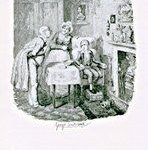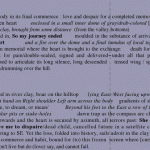1998
On the futures of electronic scholarship - an exchange among editors.
On the futures of electronic scholarship - an exchange among editors.
The culmination of ebr version 2.0 (an html- and java-based Web production), the spring 1999 "gathering of threads" introduced an important component into the journal design: the thREAD that actively conducts readers among affiliated essays.
J. Hillis Miller looks at the "multimedia" Victorian novel, embodied in ink, paper, cardboard, and glue.
In collecting essays for ebrs 6 and 7, the editors sought work that would not only talk about image and narrative theory in the networked environment; we wanted essays with design elements in their very construction. The essays were presented in the context of Anne Burdick's first integral design for the journal itself, ebr version 2.0.
1997
Joel Felix listens in on Postmodern Culture's privatization debate.
Marta Werner uncages Emily Dickinson's fragments.
John Cayley reviews the Hypertext '97 Conference, which brought together representatives from corporate and academic sectors.
Stephanie Strickland on the translation of poetry from print to screen.
A conversation with Pierre Joris and Jerome Rothenberg on the technology and politics of the millenial anthology.
From Zukofsky's "A" to Powers' Goldbug Variations, in search of a social ecology of the self-discursive text.
Millennial thoughts from Raymond Federman.
John Matthias reports on the state of British Poetry and its criticism.
The second ebr special to employ the concrete poems of Daniel Wenk, working typographical variations on the term, "electropoetics." Guest edited by Joel Felix, who in 1997 was an undergraduate Lit major at the University of Illinois at Chicago.
Alan Shaw on the poetics of composer Harry Partch and the musicality of greek prosody.
Artist Eduardo Kac writes on the attractions of the hologram as a malleable, fluid, and elastic medium for poetic expression.
Bringing the queston of 'textuality' into the cyberdebates, and refusing the conservative oppostion between contemplative reading and gaming, Daniel Punday argues that critics should embrace spinoff culture as a model for electronic writing.
Lorne Falk retells the allegory of Arachne, the divine weaver, netted in le cabinet virtuel

